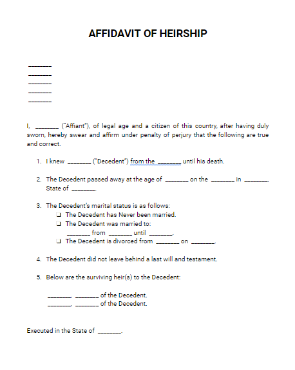- Eviction Notice Forms
- Power of Attorney Forms Forms
- Bill of Sale (Purchase Agreement) Forms
- Lease Agreement Forms
- Rental Application Forms
- Living Will Forms Forms
- Recommendation Letters Forms
- Resignation Letters Forms
- Release of Liability Agreement Forms
- Promissory Note Forms
- LLC Operating Agreement Forms
- Deed of Sale Forms
- Consent Form Forms
- Support Affidavit Forms
- Paternity Affidavit Forms
- Marital Affidavit Forms
- Financial Affidavit Forms
- Residential Affidavit Forms
- Affidavit of Identity Forms
- Affidavit of Title Forms
- Employment Affidavit Forms
- Affidavit of Loss Forms
- Gift Affidavit Forms
- Small Estate Affidavit Forms
- Service Affidavit Forms
- Heirship Affidavit Forms
- Survivorship Affidavit Forms
- Desistance Affidavit Forms
- Discrepancy Affidavit Forms
- Career Assessment - 16+ Examples, Format, Tips, Pdf Forms
- Undertaking Affidavit Forms
- General Affidavit Forms
- Affidavit of Death Forms
Heirship Affidavit
Life can be unpredictable. People often forget or fail to realize the importance of preparing for the worst. So when someone dies and leaves real property behind but without a Will, heirs to these assets need to deal with the legal challenges that come with title transfers and property acquisitions. Fortunately, loved ones of the deceased can handle these legal matters conveniently (and minus the hefty legal fees) through a Heirship Affidavit. Read More

Heirship Affidavit
Life can be unpredictable. People often forget or fail to realize the importance of preparing for the worst. So when someone dies and leaves real property behind but without a Will, heirs to these assets need to deal with the legal challenges that come with title transfers and property acquisitions. Fortunately, loved ones of the deceased can handle these legal matters conveniently (and minus the hefty legal fees) through a Heirship Affidavit.
What Is An Heirship Affidavit?
An Heirship Affidavit is a written oath that establishes the legal heirs of a person’s real property, personal property, or small estate. When the decedent dies without a Last Will and Testament and the probate court would need to determine how the estate may be distributed among the successors, the affidavit makes it possible to transfer the deceased’s assets to its rightful heirs. Another advantage of having an heirship affidavit in place is that it makes it easier for heirs to sell or give away a decedent’s lands and motor vehicles and gain access to the person’s financial accounts without having to wait months, or even years, to have this matter settled. There’s no denying how effective an affidavit of heirship can be in the appropriate distribution of a deceased’s property.
How To Write An Heirship Affidavit
The format and contents of an heirship affidavit can vary depending on the statutes of the state the property is located. But to give you an overview of what the affidavit may consist of, you may refer to the following elements:
Decedent Information
The affidavit must identify who the decedent is, the date of their birth and death, and their last place of residency before their passing. Be sure you have the supporting documents to verify this data, as the entities that will receive and assess the affidavit may need enough evidence to validate it. In some cases, these documents may be attached to the affidavit for further reference.
Heirs
It is possible for a decedent to have more than one heir. In addition to naming who these heirs are, you must also include their relationship to the decedent and, if necessary, any relevant dates, times, or places that can help declare the parties’ relationship with the decedent. While friends of the decedent may be considered as heirs, most states only accept spouses, registered domestic partners, and immediate family members as heirs.
Property Details
It’s important to be as specific and as detailed as possible when identifying the real property, personal property, and small estate involved in the transfer. The best way to make sure all of this information is correct and accurate, you may refer to the official records linked to these assets. Some of the details you’ll need to look out for include the legal description of the property, account numbers, codes, and other relative information.
Witness and Notary Public Signature
Conclude the document with a sworn statement from you, as the Affiant, declaring that the information presented in the affidavit is true and correct to the best of your knowledge. Below that statement, you need to have a signature line for affirmation from a disinterested witness and a notary public. A disinterested witness refers to a person who is not involved in the case and will not benefit from whatever outcome it yields, which is necessary to maintain a clean and unbiased proceeding.
FAQs
What happens when you file an heirship affidavit?
An heirship affidavit allows you to establish property ownership when the original owner of the land dies without leaving a Will to dictate what happens to the said property. Similar to other affidavits, it offers nothing more than a presumption that the claims made in the document are true based on the evidence provided by the Affiant. Thus, it can only prove who the true heirs of the property are without guaranteeing or finalizing the transfer of title to their names.
What are the limitations of an heirship affidavit?
While heirship affidavits seem like the most cost-efficient approach to instigating a probate proceeding, particularly in the absence of a Will, people are often oblivious to the limitations and risks that come with this seemingly convenient alternative. One thing to remember is that an affidavit does not constitute formal judgment on a disputed matter, but rather outlines the details of the decedent, the heirs, and the real property involved. Moreover, anyone can challenge the claims made in the affidavit, with the risk of the heir’s ownership being left unrecognized by external entities.
How do I prove legal heirship?
Like any other legal process, you’ll need to prove your relationship to the deceased and your involvement in the transfer or acquisition of the decedent’s property. Apart from an affidavit, a valid identity card and supporting documents regarding the deceased and the real estate in question would suffice. Keep in mind that these requirements may vary for every county or state, so make sure to visit your local recorder’s office for further assistance.
Who are the parties involved in the heirship affidavit?
The party to the affidavit are typically the spouse, domestic partner, children, or blood relatives of the decedent. While there are instances where friends or former spouse(s) of the deceased become involved, cases like this are less common to avoid conflict among heirs.
How do I file an heirship affidavit?
Note that the templates and samples you find online are merely a guide meant to help you draft your affidavit before the official copy is filed with the appropriate court or county recorder’s office. This draft may help you determine the kind of information you’ll need along with the general outline of your content.
Heirship affidavits allow family and relatives of the deceased to deal with real property matters without court intervention. However, the potential complications of an heirship affidavit make it the least favorable option for cases that involve properties of a higher value. It’s always a good idea to consult your county recorder’s office or seek professional advice from a lawyer to discuss your situation and determine the best course of action.
